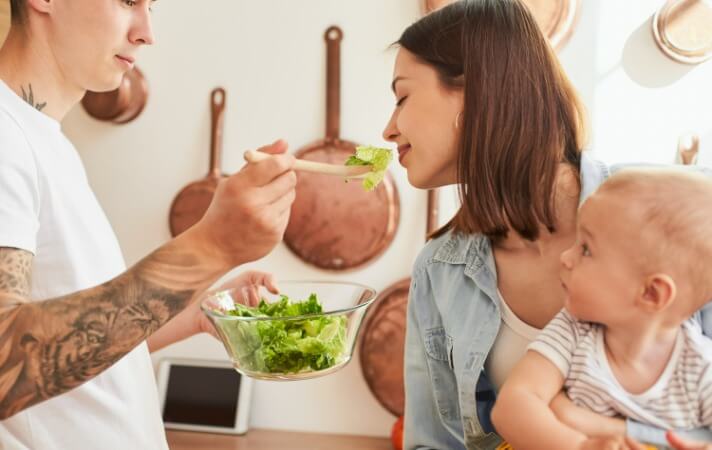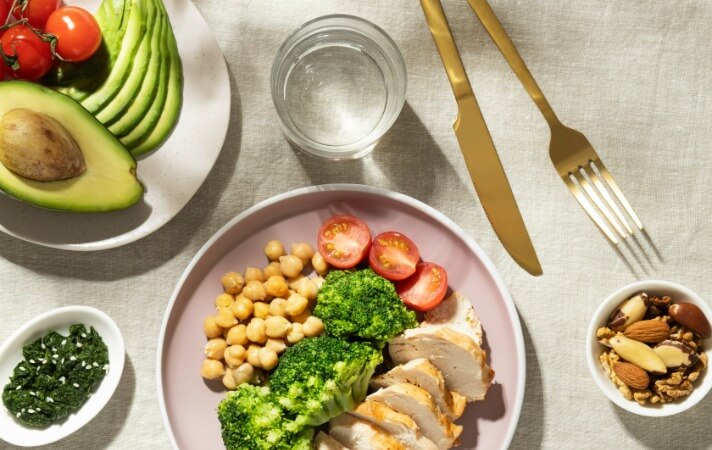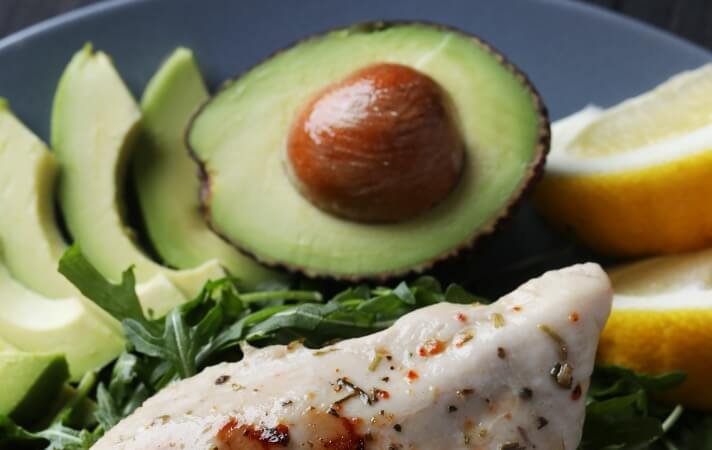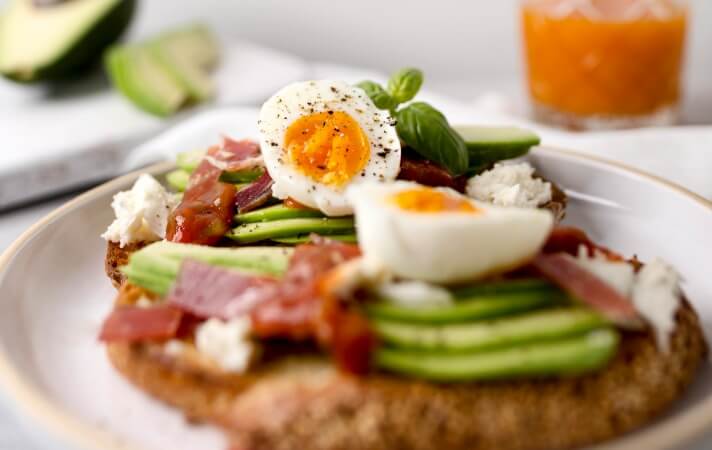After giving birth, something that a lot of mothers do is indulge in all of the meals that they were not allowed when pregnant. Giving birth is a pretty big deal, so don’t feel guilty if you don’t eat the best after giving birth, you’ve earned it.
The time proceeding labour should be spent caring for yourself and doing what you need to improve your mood after giving birth. After all, you’ve definitely earned it.
If you’re done with the indulgence, and are ready to bounce back after pregnancy, your diet is something that you will need to focus on.
At POW8R, we will always recommend that you exercise if you want to get your flat tummy back after pregnancy, but mastering the right diet is equally as important as doing the right exercises.
If you want to regain your confidence and bounce back after pregnancy, we would definitely recommend downloading our postpartum fitness app and building a well-thought-out diet plan.
Read on for brilliant tips for building the perfect postpartum diet plan.
Nutritional Needs When Recovering From Labour

In case we haven’t made it clear enough already, you need to give yourself some credit for giving birth. Pregnancy isn’t easy, and labour is even harder, so if your body does not look how you would like it to right now, remember not to put too much pressure on yourself. You have done one of the hardest things that humans can do.
We understand that it can be difficult not to hyperfocus on your appearance, but meeting your nutritional needs after giving birth is incredibly important. If you are not happy with the look of your tummy, you can meet your nutritional goals while doing postpartum core exercises to see the best results.
Some of your nutritional needs after giving birth include:
Protein
It is incredibly important to meet your protein needs after giving birth. Your body goes through a lot during labour, and protein is essential for repairing damaged muscles and tissues.
After you give birth, your hormones are usually all over the place. Luckily, protein can help regulate hormones such as estrogen and progesterone, which is also a necessity if you are breastfeeding. When planning your diet, ensure that your postpartum foods are rich in protein.
Foods Rich in Protein
If you are not sure which protein-rich foods you should eat after giving birth, consider the following:
- Eggs
- Oily Fish
- Low-fat Dairy
- Poultry
- Leafy Greens
- Bone Broth
Iron
Getting enough iron is important postpartum because it is essential for maintaining healthy blood and red blood cells. Being deficient in iron can lead to anaemia, which can cause fatigue and even postnatal depression.
Foods Rich in Iron
If you are looking to increase your iron intake, you should consider the following foods:
- Beans and Pulses
- Nuts and Seeds
- Shellfish
- Meats
Calcium and Vitamin D

It is no secret that calcium and vitamin D should be a part of everyone’s diet, but it is even more important after you have given birth.
Vitamin D helps your bones absorb calcium and improves your bone health. When breastfeeding, a mother passes on a lot of calcium to their baby to better the health of both mother and baby, preventing deficiencies in the infant.
Vitamin D positively impacts mood and mental health, which may also help you build a positive mindset that can motivate you to get back in shape after labour with post-pregnancy fitness.
Foods Rich in Vitamin D and Calcium
Some foods that you should consider if you would like to improve your vitamin D and calcium intake include:
- Eggs
- Fatty Fish
- Dairy Products
- Mushrooms
- Fortified Foods
Healthy Fats
A common misconception is that women should avoid all fats after giving birth. Although the word ‘fat’ has many negative connotations, there are healthy, beneficial fats that women should try to include in their diets.
Healthy fats are fantastic for hormone regulation, and they can actually help your body heal after the delivery.
Healthy Fats You Should Try

The following foods are great options if you are looking to include more healthy fats in your diet:
- Nuts
- Olive Oil
- Tofu
- Dark Chocolate
- Salmon
- Eggs
There are even more healthy fats, so they should be easy to integrate into your diet.
Hydration
Hydration is incredibly important during postpartum for several reasons. For example, dehydration may affect milk production, which you should avoid if you plan to breastfeed after giving birth.
If you have undergone a C-section, staying hydrated can help heal and prevent recovery fatigue.
Staying Hydrated Through Food
We will always encourage you to drink as much water as you possibly can, especially if you are breastfeeding. Still, if you are someone who finds it difficult to drink enough water, you can improve your hydration through the following foods:
- Cucumbers and Lettuce
- Tomatoes
- Melon
- Oranges
- Kiwi
Hopefully, these lists have given you better insight into the kinds of foods you should include in your diet. If matched with a good postpartum fitness routine, your body should be able to bounce back.
Foods You Should Avoid Postpartum

Now that you know which foods you should include in your diet, it’s also important to be aware of foods you should avoid after pregnancy.
Highly Processed Foods
Highly processed foods should be avoided where possible, as they can harm your health and the health of your baby.
Processed foods are often low in fibre, minerals and vitamins, meaning that when you eat them, you do not get a lot of nutrients.
Because ultra-processed foods are often high in sugar and unhealthy fats, which could actually harm your cause and cause weight gain.
Excess Caffeine
If you are breastfeeding, you should avoid caffeine if possible. Caffeine passes through breast milk, which can be incredibly harmful to the baby, making them irritable and easily unsettled.
The NHS recommends limiting caffeine to 200mg daily if you still wish to drink caffeine postpartum, especially if you are breastfeeding. We recommend avoiding caffeine if you can.
The Importance of Supplements
Giving birth takes a lot out of your body and can cause nutritional deficiencies, which can be detrimental to new mothers. To ensure your body receives the necessary vitamins D, iron, E, and B12, you must take supplements after giving birth.
Supplements are easy to get in the UK. They are available over the counter or at most shops. Be sure to try a selection and see what works for you, or consult a doctor for advice on the right combination
Supporting Your Healthy Diet With Exercise
It is no secret that developing a good diet is the best way to lose weight, but implementing an exercise routine can speed up the process while building strength and toning your body.
Not only can exercise improve your fitness, but it can also drastically improve your mood and make you feel better about yourself.
If you want to implement a workout routine but feel like you will struggle to fit it around caring for your baby, look at this guide that outlines how to exercise with an infant.
Postpartum Meal Plan Example

Starting new habits can be difficult; luckily for you, we are here to help. Here is a simple postpartum meal plan example that you can reference when planning your own meals.
We know how difficult it can be to plan postpartum breakfast ideas, so be sure to pay particular attention to that section.
Breakfast – Avocado and Egg Toast
- 1 slice of whole-grain toast
- ½ avocado, mashed
- 1 poached or boiled egg
- A sprinkle of chia seeds and a pinch of salt/pepper
Drink:
- 1 glass of fortified orange juice or milk (for calcium and vitamin D)
If you would like to add more protein to this meal, you could add an additional egg.
Lunch – Grilled Chicken and Quinoa Salad
- 3 oz grilled chicken breast (or tofu for a vegetarian option)
- ½ cup cooked quinoa
- 1 cup mixed greens (spinach, arugula, kale)
- ¼ cup shredded carrots and sliced cucumber
- Drizzle of olive oil and lemon juice
Drink:
- 1 glass of water
The olive oil can be substituted for a balsamic vinegar glaze.
Dinner – Salmon with Sweet Potato and Steamed Veggies
- 4 oz baked or grilled salmon (rich in omega-3s)
- 1 medium sweet potato, roasted
- 1 cup steamed broccoli and carrots
Drink:
- 1 glass of water or herbal tea
Of course, we all have different tastes, so these recipe recommendations may sound amazing to some and off-putting to others. You can alter these recipes to your taste, and do not be afraid to include some low-calorie snacks between meals. This will make it easier to maintain your diet plan.
We suggest snacking on high-protein yoghurt and fruits, as these will ensure that you feel fuller for longer.
Take Your Health to The Next Level With POW8R
We hope this blog has given you better insight into building the perfect postpartum diet plan. Though diet is important when it comes to bouncing back after pregnancy, it is also essential that you develop a consistent workout schedule.
If you find it hard to stay motivated, sticking to a plan created and encouraged by someone else can be a great way to stay on track. If you feel that is what you need, consider becoming a POW8R member today.
Our new Android and IOS fitness app makes it easier than ever to stay on track with a workout routine and structure that suits your lifestyle.